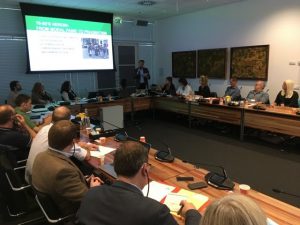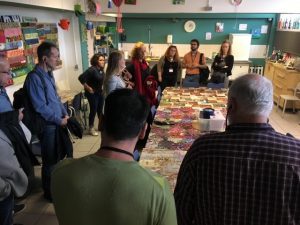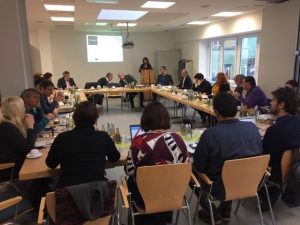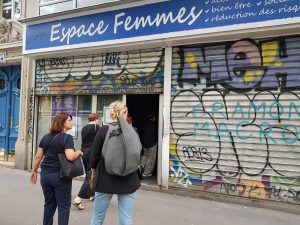Study visits
SOLIDIFY conducted study visits to all five partner cities that operate supervised drug consumption rooms (Barcelona, Essen, Paris, Strasbourg, and The Hague). The overall objective of these intense, 2-day visits was to enable the consortium to gain in-depth knowledge of the approach taken by the respective host partners to harm reduction strategies in general and supervised drug consumption facilities (SDCFs) in particular, and to learn about the different accompanying services. The visits provided an opportunity for discussing good practices, learning about the different models of SDCF and their advantages and shortcomings, and exchanging among peers on the management of such facilities.
The study visits mobilised the whole SOLIDIFY consortium, i.e. all the partner local authorities (2 representatives: 1 from the local administration and 1 from a civil society partner) and the expert panel. A particular topical focus was the relations between the SDCFs and the local neighbourhood and community, including the efforts undertaken by the municipalities to improve their acceptance and promote feelings of security and social cohesion at the local level, an on local cooperation developed around the facilities, e.g. with the police, public prosecution, neighbourhood initiatives or other stakeholders from the security sector.
Barcelona
The fi rst visit to Barcelona (ES) was held on 21 and 22 June 2018 and hosted by the Public Health Agency of Barcelona, an institution co-financed by the city and the Catalan region that is in charge of a wide range of health-related services, and co-organised with the NGO Asociación bienestar y desarrollo (ABD). The Agency and its partners operate drug addiction centres – of which eight spread out throughout the city are integrated (harm reduction and treatment) and seven only provide treatment –, which are generally well accepted by the population.
rst visit to Barcelona (ES) was held on 21 and 22 June 2018 and hosted by the Public Health Agency of Barcelona, an institution co-financed by the city and the Catalan region that is in charge of a wide range of health-related services, and co-organised with the NGO Asociación bienestar y desarrollo (ABD). The Agency and its partners operate drug addiction centres – of which eight spread out throughout the city are integrated (harm reduction and treatment) and seven only provide treatment –, which are generally well accepted by the population.

The project partners visited the drug consumption facility “CAS Baluard”, which provides a safe environment for injecting and smoking as well as access to health and other support services. The centre also has a mobile unit that caters to users in remote areas and outside of the opening hours of institutionalised services. Moreover, the visit included discussions with representatives from local authorities and law enforcement agencies on the local partnerships organised to improve acceptance of the facilities by the local population and to regulate conflicts that may arise among users and other groups. Barcelona is an example of an SDCF that operates in close cooperation with the healthcare system as part of a network of consumption facilities spread throughout the city.
The Hague
 The second visit to The Hague was held on 18 and 19 October 2018 and was hosted by the city’s security department. The visit programme included presentations and discussions on the Dutch approach to drug policies and harm reduction as well as the particular approach of The Hague, its history in implementing SDCFs, and an in-depth presentation and discussion on the cooperation between the municipality and the police.
The second visit to The Hague was held on 18 and 19 October 2018 and was hosted by the city’s security department. The visit programme included presentations and discussions on the Dutch approach to drug policies and harm reduction as well as the particular approach of The Hague, its history in implementing SDCFs, and an in-depth presentation and discussion on the cooperation between the municipality and the police.
 Three field visits were conducted to the shelters Domus and Woodstock, as well as to the coffee shop “Creemers”. The Hague has adopted a specific model of shelter facilities such as Domus and Woodstock, which have replaced the SDCFs that were previously operated by the municipality, in order to cater to the changing needs of the local users and in line with the local “housing first” approach. These facilities offer long-term shelter for active drug users and provide safe conditions for use as well as socio-medical follow-up offers.
Three field visits were conducted to the shelters Domus and Woodstock, as well as to the coffee shop “Creemers”. The Hague has adopted a specific model of shelter facilities such as Domus and Woodstock, which have replaced the SDCFs that were previously operated by the municipality, in order to cater to the changing needs of the local users and in line with the local “housing first” approach. These facilities offer long-term shelter for active drug users and provide safe conditions for use as well as socio-medical follow-up offers.
Essen
 The third study visit to Essen was hosted by this city and Suchthilfe direkt gGmbH on 14 and 15 January 2019. The programme included a presentation of the history and impact of SDCFs in Germany, a visit to the local SDCF and drug treatment centre, a presentation of the neighbourhood management system, and an in-depth discussion on the “local partnership for public order” which involves the municipality, the police and many civil society actors working together to manage public addictive behaviours and consumption in public spaces.
The third study visit to Essen was hosted by this city and Suchthilfe direkt gGmbH on 14 and 15 January 2019. The programme included a presentation of the history and impact of SDCFs in Germany, a visit to the local SDCF and drug treatment centre, a presentation of the neighbourhood management system, and an in-depth discussion on the “local partnership for public order” which involves the municipality, the police and many civil society actors working together to manage public addictive behaviours and consumption in public spaces.
 Opened in 2001, the Essen SDCF is characterised by its integrated approach: it is situated in a building entirely dedicated to drug support services, which also offers medical services, therapy, shelters and various psycho-social support offers with easy referrals and seamless cooperation between the different relevant professions. Moreover, Essen’s approach is strongly focused on the SDCF’s impact on urban security, which is the object of a long-standing “public order partnership” between the local authority, police, public prosecution and other stakeholders.
Opened in 2001, the Essen SDCF is characterised by its integrated approach: it is situated in a building entirely dedicated to drug support services, which also offers medical services, therapy, shelters and various psycho-social support offers with easy referrals and seamless cooperation between the different relevant professions. Moreover, Essen’s approach is strongly focused on the SDCF’s impact on urban security, which is the object of a long-standing “public order partnership” between the local authority, police, public prosecution and other stakeholders.
Strasbourg
 The fourth visit took place in Strasbourg on 3 and 4 April 2019 and was hosted by Commune de Strasbourg, Association Ithaque and Efus. It included a public colloquium – held in the European Parliament’s premises – on “Low Risk Drug Consumption Rooms In Europe: Assessment and Prospects”, which gathered more than 200 participants who discussed the history of SDCFs in Europe since the 1980s and strategies to further promote such facilities in the future. Introduced by a video-message from the Mayor of Strasbourg, Roland Ries, and the Mayor of Liège and President of Efus Willy Demeyer, the meeting featured more than 25 speakers who presented local practices and exchanged knowledge.
The fourth visit took place in Strasbourg on 3 and 4 April 2019 and was hosted by Commune de Strasbourg, Association Ithaque and Efus. It included a public colloquium – held in the European Parliament’s premises – on “Low Risk Drug Consumption Rooms In Europe: Assessment and Prospects”, which gathered more than 200 participants who discussed the history of SDCFs in Europe since the 1980s and strategies to further promote such facilities in the future. Introduced by a video-message from the Mayor of Strasbourg, Roland Ries, and the Mayor of Liège and President of Efus Willy Demeyer, the meeting featured more than 25 speakers who presented local practices and exchanged knowledge.
 The participants also visited the local SDCF as well as other drug support services in Strasbourg and Kehl and met with the Deputy Mayor in charge of health, Alexandre Feltz, as well as police representatives. Strasbourg’s approach is characterised by the fact that the SDCF is closely integrated with a neighbouring hospital, that it is well accepted by local residents, and that it cooperates with partner German institutions in the Strasbourg-Ortenau Eurodistrict.
The participants also visited the local SDCF as well as other drug support services in Strasbourg and Kehl and met with the Deputy Mayor in charge of health, Alexandre Feltz, as well as police representatives. Strasbourg’s approach is characterised by the fact that the SDCF is closely integrated with a neighbouring hospital, that it is well accepted by local residents, and that it cooperates with partner German institutions in the Strasbourg-Ortenau Eurodistrict.
Paris
 The study visit to Paris was organised on 17 and 18 June 2019 by Efus in close cooperation with the Metropolitan Mission for the Prevention of Risky Behaviours (Mission métropolitaine de prévention des conduites à risques) and the Gaia association. The programme included roundtable discussions with representatives from the city council and different local and regional public health, urban security and law enforcement services, a visit to the SDCF located near the Gare du Nord train station, guided tours to several harm reduction services in Paris, the presentation of a documentary followed by a discussion with the filmmaker, as well as internal meetings dedicated to the Solidify project’s coordination and evaluation. The focus of this visit was the integration of the experimental SDCF in the city of Paris’ complex harm reduction and drug support system.
The study visit to Paris was organised on 17 and 18 June 2019 by Efus in close cooperation with the Metropolitan Mission for the Prevention of Risky Behaviours (Mission métropolitaine de prévention des conduites à risques) and the Gaia association. The programme included roundtable discussions with representatives from the city council and different local and regional public health, urban security and law enforcement services, a visit to the SDCF located near the Gare du Nord train station, guided tours to several harm reduction services in Paris, the presentation of a documentary followed by a discussion with the filmmaker, as well as internal meetings dedicated to the Solidify project’s coordination and evaluation. The focus of this visit was the integration of the experimental SDCF in the city of Paris’ complex harm reduction and drug support system.
 One characteristic of the Paris experience is how carefully the SDCF was established as part of the existing service system in order to ensure proper functioning and relations with other institutions providing support to drug users. Another key aspect is acceptance by local residents. The municipality of Paris is particularly active in this respect, which not only concerns relations with local communities but also advocacy of the benefits of SDCFs in the public political debate, which has been at times quite heated in France. This aspect has raised considerable interest among the other project partners.
One characteristic of the Paris experience is how carefully the SDCF was established as part of the existing service system in order to ensure proper functioning and relations with other institutions providing support to drug users. Another key aspect is acceptance by local residents. The municipality of Paris is particularly active in this respect, which not only concerns relations with local communities but also advocacy of the benefits of SDCFs in the public political debate, which has been at times quite heated in France. This aspect has raised considerable interest among the other project partners.

![]() SOLIDIFY was co-funded by the European Commission – Justice Programme Supporting Initiatives in the Field of Drugs Policy
SOLIDIFY was co-funded by the European Commission – Justice Programme Supporting Initiatives in the Field of Drugs Policy





